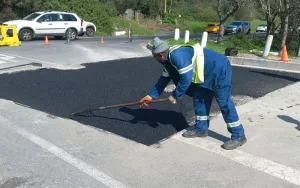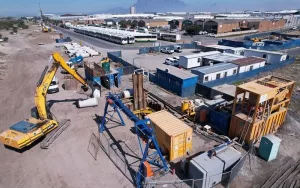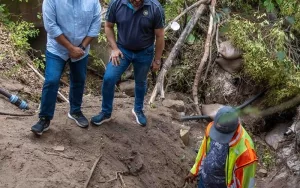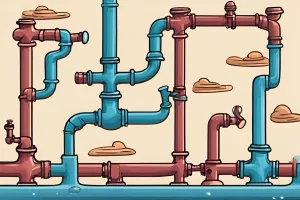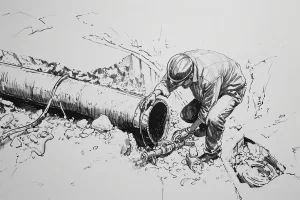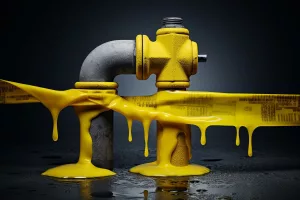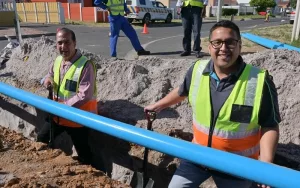Cape Town is getting ready for important water maintenance from October 8 to 10, 2024. Some neighborhoods will experience water disruptions, like Bloekombos and Wallacedene, which will be affected from September 30 to October 18. Shorter outages will hit Claremont and Newlands on October 8. The city is committed to keeping water flowing smoothly, so they’re fixing pipes and valves, even if it means a little inconvenience now. Residents should store water in clean containers and stay updated through the city’s alerts to make things easier during this time.
Cape Town has set aside R55 million to refurbish its water infrastructure, aiming to improve the efficiency of its services and speed up restorations. The city is using both internal and external resources to handle the increased workload and minimize disruptions to residents. The goal is to learn from the ongoing restoration process to make future reinstatements more streamlined, and the city is doubling annual water pipe replacements to 50km to ensure sustainable development and access to quality water and infrastructure for its residents.
The flooding in Khayelitsha and Cravenby was caused by neglected stormwater infrastructure and illegal dumping, resulting in dangerous living conditions for families. The Roads Infrastructure Management department and the community worked together to resolve the crisis, highlighting the importance of civic responsibility and maintaining urban areas. The impact of illegal dumping was significant, accumulating beneath the surface and posing health and economic risks. This serves as a lesson in the role each individual can play in improving living conditions for all inhabitants.
Cape Town is upgrading its aging water and sanitation infrastructure due to population growth and deteriorating pipes, with the Water and Sanitation Directorate aiming to replace 50,000 meters of water pipes by 2023/2024. The city has already replaced over 40,315 meters by March 2024, with dedicated teams working on projects across various locations to achieve significant progress towards their goal. This infrastructure overhaul is a story of resilience and determination, securing Cape Town’s sustainable future.
Hout Bay is using stateoftheart trenchless pipecracking technology to replace over 3,300 meters of outdated water pipes, showcasing the city’s dedication to adopting innovative solutions to tackle its infrastructural hurdles. The technology is costeffective, reduces disturbances, and facilitates quicker completion times, making it a practical choice for the world with scarce resources. The project is expected to be accomplished by June 2024, signifying another step towards urban regeneration and a sustainable future.
Get ready for a carefully planned maintenance task happening in Cape Town from March 18th to 26th, 2024. The Water and Sanitation Directorate will upgrade the city’s water infrastructure by installing pipes, replacing valves, and repairing water meters in various neighborhoods. Although there may be temporary water service interruptions, the associated reservoirs will be filled beforehand to ensure an uninterrupted water supply, and residents are encouraged to follow the City of Cape Town X account for live updates on the maintenance work.
Plumstead is revamping its water infrastructure with an ecofriendly, efficient, and sturdy water system through an innovative trenchless pipe cracking technology. The project is part of the Mayor’s Priority Programme, prioritizing sustainability in urban development. This costefficient and sustainable method not only improves the quality of life for residents but also conserves ecosystems, landscapes, and trees, making it a landmark initiative for the city.
The Water and Sanitation Directorate of Cape Town is conducting essential maintenance work on the water infrastructure in Constantia. The aim is to rectify the water supply interruptions plaguing the communities of Constantia Nek and Rhodes Drive. The city has positioned a water tanker at Constantia Nek Circle, and regular updates are being disseminated to the residents to ensure transparency and effective communication. The city remains committed to resolving the issue swiftly, with a focus on safety and managing expectations, while also encouraging residents to stay updated and prepared.
South Africa is facing a water crisis, with nearly half of all water supply systems posing health risks due to bacterial contamination and over 47% of clean water lost through leakage. The country’s water infrastructure urgently needs an additional 400 competent individuals to manage the deteriorating systems. With a dire need for skilled personnel to operate stateoftheart facilities and mitigate human health risks, immediate steps must be taken to improve the poor quality of drinking water and increase monitoring and accountability.
Unlocking the Future: Athlone’s Pioneering R863.6 Million Water Overhaul Sets New Standards in Sustainability and Reliability
Athlone is revamping its water infrastructure by replacing outdated water mains with new uPVC pipes as part of its yearly pipe replacement program. The project aims to provide a reliable water supply in the long term and has allocated a significant amount of funds for water and sewer pipe replacement programs. Upgrades to the pipes in the Bridgetown suburb involve replacing outdated, fibre cement water mains with new 110mm diameter pipes that conform to compliance standards set by the South African Bureau of Standards. The initiative showcases the city’s commitment to sustainable development and the wellbeing of its citizens.
The Water and Sanitation Directorate of the City of Cape Town proudly announces the successful utilisation of 95% of its capital budget for the 2022/23 fiscal year. The accomplishment reinforces the city’s commitment to investing in vital infrastructure to ensure the provision of highquality drinking water and dignified sanitation, particularly in informal settlements.
Winter can bring unpredictable and sometimes fierce weather conditions, particularly in Cape Town. The City of Cape Town understands the importance of taking proactive measures to reduce the risks associated with the winter months. To this end, the City has established the Winter Task Team, consisting of over 25 City departments and external partners, to oversee risk mitigation measures before and during winter, with the Disaster Risk Management Centre (DRMC) coordinating the team’s work.


